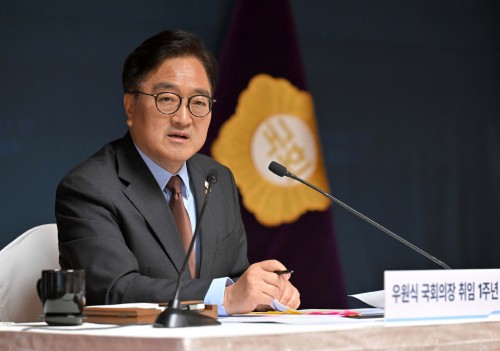 |
| National Assembly Speaker Woo Won-shik speaks at a press conference marking his first anniversary in office at Sarangjae in the National Assembly on June 11. / Photo by Lee Byunghwa |
National Assembly Speaker Woo Won-shik on June 11 reaffirmed President Lee Jae-myung’s strong commitment to constitutional reform but stressed that discussions should begin only after the government secures political stability.
At a press conference marking his first year in office, held at Sarangjae in the National Assembly compound, Speaker Woo outlined key reform priorities: enabling presidential reelection, strengthening parliamentary powers, including the May 18 Gwangju Democratic Uprising in the Constitution’s preamble, and requiring parliamentary approval for declarations of martial law.
Woo recalled discussions with party leaders following the April impeachment of the previous president. “We had agreed to pursue constitutional reform as part of the presidential race,” he said. “But due to strong public sentiment calling for the removal of anti-democratic forces, progress was stalled.”
He emphasized that President Lee shares a clear vision for reform. “The president’s will for constitutional amendment is firm and unequivocal,” he said. “His pledges align closely with what I’ve discussed with him.”
Woo clarified that there are no plans to push for a parliamentary cabinet system. “I’ve never proposed shifting to a cabinet system,” he stated.
On the timing of reform, he said, “The government is still in its early phase. Achieving stable governance will take time and will involve navigating many challenges.” He called for a broad consultation process involving political parties, civil society, and the government to determine the right timing for constitutional discussions. “The National Assembly speaker should also play a role in facilitating that dialogue,” he added.
As an urgent legislative priority, Woo pointed to the need for a supplementary budget. “We must take bold action to stabilize people’s livelihoods amid domestic and global crises in the economy, diplomacy, and trade,” he said. “We will take full responsibility in pushing forward with the urgent supplementary budget.”
He also pledged to strengthen the legislative and fiscal oversight roles of the National Assembly. “Under the principle of separation of powers, the Assembly’s primary roles are lawmaking and budgeting,” Woo said, adding that he plans to pursue organizational and personnel reforms to enhance legislative support and budget review capacity.
Most Read
-
1
-
2
-
3
-
4
-
5
-
6
-
7





















